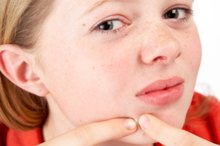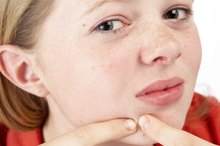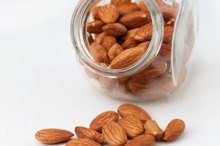5-HTP and Acne
5-hydroxytryptophan, or 5-HTP, is a naturally occurring amino acid and chemical precursor to neurotransmitters, or brain hormones. As such, 5-HTP has become a popular over-the-counter natural remedy for depression; it’s sometimes recommended as an appetite suppressant and sleep aid as well. Acne has a variety of causal factors, but hormone imbalance is a primary one. Some anecdotal claims suggest that 5-HTP may help control acne, while others suggest that it may contribute to outbreaks. Consult with a dermatologist if acne is a concern for you.
5-HTP
5-HTP is a metabolic intermediate in the synthesis of serotonin and melatonin from the amino acid tryptophan. Serotonin is a neurotransmitter required for balanced mood and feelings of well-being. Several clinical trials have demonstrated the effectiveness of 5-HTP in the treatment of depression, according to the "Compendium of Pharmaceuticals and Specialties." 5-HTP works in a similar fashion to antidepressant drugs such as Prozac and Zoloft. 5-HTP is also required for the production of melatonin, which is secreted from the pineal gland and required for normal sleep cycles. It is sold over-the-counter in the United States and Canada as a dietary supplement.
- 5-HTP is a metabolic intermediate in the synthesis of serotonin and melatonin from the amino acid tryptophan.
- 5-HTP works in a similar fashion to antidepressant drugs such as Prozac and Zoloft.
Acne
Chaste Tree Berry for Acne
Learn More
Acne is a skin condition characterized by reddened, inflamed pustules or cysts that occur primarily on the face, neck, shoulders and back. Stress, depression and feelings of anxiety are also linked to acne outbreaks.
5-HTP and Acne
5-HTP is well established for its ability to reduce depression, anxiety and symptoms of PMS. As such, if any of these factors are the underlying cause of your acne outbreaks then supplementing with 5-HTP may be of benefit. 5-HTP also reduces carbohydrate cravings, which can reduce the amount of sugar in your diet, according to the "American Diabetes Association Guide to Herbs and Nutritional Supplements." Excessive consumption of refined sugar reduces the function of your immune system, increasing your risk of bacterial infections 4. Further, you may have a sensitivity to processed sugar that manifests as inflamed skin. Some people report that taking 5-HTP leads to acne outbreaks, but the “PDR for Nutritional Supplements” notes that it is most likely related to vitamin B-6 overdose, as more than 20 milligrams daily affects nerves and skin 5.
- 5-HTP is well established for its ability to reduce depression, anxiety and symptoms of PMS.
- 5-HTP also reduces carbohydrate cravings, which can reduce the amount of sugar in your diet, according to the "American Diabetes Association Guide to Herbs and Nutritional Supplements.
- "
Recommendations
Home Remedy for an Infected Pimple
Learn More
5-HTP is found in food, but in insignificant quantities to make an impact on brain hormones, so supplementation is the only practical way of getting any therapeutic benefit from it. Choose a supplement without B-6 if you are concerned about acne side effects. At the time of publication, there is no evidence to link 5-HTP as a direct therapy for acne. Consult with your dermatologist about better understood and more commonly used remedies for acne.
- 5-HTP is found in food, but in insignificant quantities to make an impact on brain hormones, so supplementation is the only practical way of getting any therapeutic benefit from it.
- At the time of publication, there is no evidence to link 5-HTP as a direct therapy for acne.
Related Articles
References
- Human Metabolism: Functional Diversity and Integration; J. Ramsey Bronk
- Compendium of Pharmaceuticals and Specialties; Canadian Pharmacists Association
- General and Systematic Pathology; Paul Bass et al.
- American Diabetes Association Guide to Herbs and Nutritional Supplements; Laura Shane-McWhorter
- PDR for Nutritional Supplements; Sheldon Hendler and David Rorvik
- Zeichner JA, Baldwin HE, Cook-bolden FE, Eichenfield LF, Fallon-friedlander S, Rodriguez DA. Emerging Issues in Adult Female Acne. J Clin Aesthet Dermatol. 2017;10(1):37-46. PMID:28210380
- Gollnick HP, Zouboulis CC. Not all acne is acne vulgaris. Dtsch Arztebl Int. 2014;111(17):301-12. https://doi.org/10.3238/arztebl.2014.0301
- Tanghetti EA. The role of inflammation in the pathology of acne. J Clin Aesthet Dermatol. 2013;6(9):27-35. PMID:24062871
- Elsaie ML. Hormonal treatment of acne vulgaris: an update. Clin Cosmet Investig Dermatol. 2016;9:241-8. https://doi.org/10.2147/CCID.S114830
- Questions and Answers About Acne. National Institute of Arthritis and Musculoskeletal and Skin Diseases (NIAMS). Jan 2016. National Institutes of Health.
- Zaenglein AL, Pathy AL, Schlosser BJ, Alikhan A, Baldwin HE, et. al. Guidelines of Care for the Management of Acne Vulgaris. Journal of the American Academy of Dermatology 74.5 (2016): 945-73. doi:10.1016/j.jaad.2015.12.037
Writer Bio
Sirah Dubois is currently a PhD student in food science after having completed her master's degree in nutrition at the University of Alberta. She has worked in private practice as a dietitian in Edmonton, Canada and her nutrition-related articles have appeared in The Edmonton Journal newspaper.









